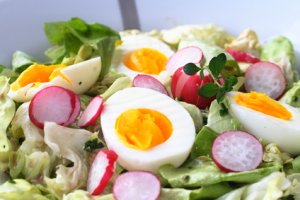Eggs in the salad increase the uptake of vitamin E which is important for the cardiovascular system
 A new study shows that adding eggs to your mixed salad increases the uptake of vitamin E from the vegetables, so don’t let your fear of fat and cholesterol keep you from consuming eggs. Eggs (yoke and white) contain a multitude of nutrients that are beneficial for your cardiovascular system and blood sugar.
A new study shows that adding eggs to your mixed salad increases the uptake of vitamin E from the vegetables, so don’t let your fear of fat and cholesterol keep you from consuming eggs. Eggs (yoke and white) contain a multitude of nutrients that are beneficial for your cardiovascular system and blood sugar.
According to Wayne W. Campbell who is a professor of nutritional science at Purdue University in Indiana, vitamin E is one of the nutrients, which the (generally) low-fat American diet typically lacks. Getting too little of this lipid-soluble vitamin poses a problem, as it is a powerful antioxidant that protects our cells and the cardiovascular system. Also, vitamin E inhibits inflammation, which is involved in numerous diseases such as atherosclerosis, diabetes, rheumatism, and cancer. It is therefore vital that we humans get enough vitamin E to prevent these and other diseases. This is possible by making dietary adjustments, which are not just about consuming more foods with vitamin E but also a matter of improving the uptake of the vitamin.
Campbell and his team of researchers point out that the uptake of vitamin E is 4-7 times greater when you add three eggs (both the yoke and white) to your salad. The study and the way in which it was conducted writes history because the researchers measured the uptake of vitamin E from the diet and not from supplements that contain far higher quantities of vitamin E.
The study is published in The Journal of Nutrition.
Eggs increase the nutritional value of other foods
Vitamin E is lipid-soluble and therefore typically found in things like plant oil, nuts, kernels, seeds, avocado, and green vegetables. It is also found in cod liver oil and milk fat. Eggs are very nutritious and also contain a little vitamin E.
As part of the study, the scientists measured the uptake of vitamin E from the diet when whole eggs were included. That way, they could determine the exact uptake of vitamin E from a diet that was low-fat to begin with.
Based on their findings, the researchers pointed out how a single food type is able to increase the uptake and nutritional value of other foods when taken in combination.
Eggs contain the following nutrientsThe egg white contains protein, while the yoke contains cholesterol, lecithin, lutein, selenium, vitamin A, B vitamins, and a little vitamin E. |
Eggs stabilize blood sugar levels
Egg white contains complete proteins that contribute to maintaining stable blood sugar levels, which helps us feel satiety for prolonged periods of time. Because unstable blood sugar levels are known to cause fatigue, headaches, poor concentration, and a craving for sweets (it may eventually even lead to insulin resistance and type-2 diabetes), it is highly important to stabilize your blood sugar levels by consuming balanced, protein-rich main meals that contain eggs.
Eggs contain several nutrients that are good for cardiovascular healthThis is the case with e.g. lecithin plus antioxidants like vitamin E, vitamin A, and selenium. |
Eggs enhance the uptake of important antioxidants
In 2015, scientists from North State Carolina University reported that eggs are able to increase the uptake of carotenoids from mixed salad – including beta-carotene, lutein, zeaxanthin, and lycopene, all of which are powerful antioxidants with different functions in the body.
Beta-carotene is found in vegetable sources like carrots and spinach and gets converted to regular vitamin A (retinol) in the intestinal mucosa.
In the study, the participants were asked to consume either no eggs, one and a half egg, or three eggs in combination with a salad that was served with three grams of canola oil. The eggs were served as scrambled eggs to ensure that both the yoke and white part were consumed. The study revealed that the uptake of different carotenoids was 3-8 times higher in the diet with three eggs compared with the diet that did not include any eggs.
Earlier studies have also shown that the uptake of carotenoids is better when a large salad is consumed as an actual main meal rather than several smaller salads consumed in the course of the day.
The North State Carolina University researchers also focused on understanding how protein and exercise influences elderly people’s health.
Free radicals harm your cardiovascular system and are involved in many diseasesFree radicals are a byproduct of respiration, and free radicals increase as a result of e.g. stress, ageing processes, poisoning, tobacco smoke, and radiation. Free radicals are aggressive molecules that attack the cellular surfaces, causing chain reactions inside and in between the cells. Free radicals are also able to cause inflammation that is involved in the majority of chronic diseases. |
Antioxidants like vitamin E protect against free radicalsThe only thing that protects against free radicals are various antioxidants. Our diet provides vitamins A, C, and E plus selenium, zinc, and a number of plant compounds. Coenzyme Q10, which we humans are able to synthesize in the body, is also a powerful antioxidant, but levels of this compound drop with increasing age. |
References:
J.E. Kin, M.G. Ferruzzi W.W. Campbell. Egg Consumption Increases Vitamin E Absorption from Co-Consumes Raw Mixed Vegetables in Healthy Young Men. Journal of Nutrition. 2016
Purdue University. Toss eggs onto salads increase Vitamin E absorption. Science Daily october 2016
Pernille Lund. Q10 – fra helsekost til epokegørende medicin, Ny Videnskab 2014
Search for more information...
- Created on .








